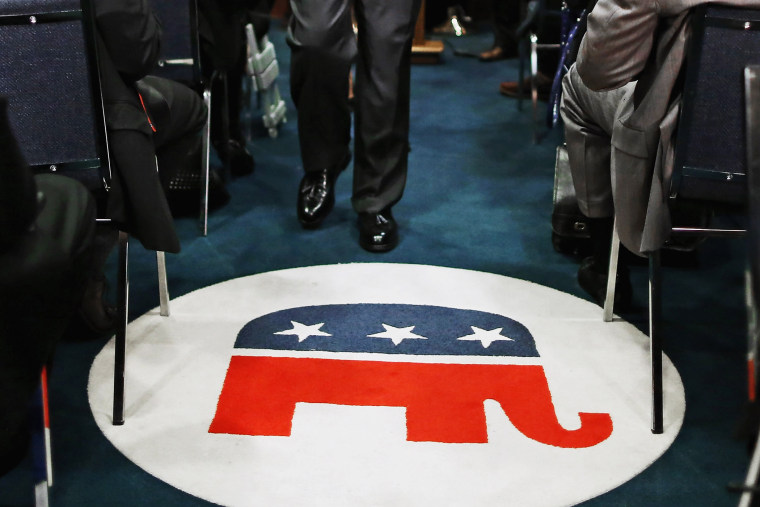The Washington Post ran an interesting front-page piece this morning on the GOP's intra-party tensions, which included a rather dramatic opening paragraph:
A pair of Republican senators sounded an alarm Tuesday about President Trump's fitness for office and warned that his actions were degrading and dangerous to the country -- an extraordinary breach that threatens his legislative agenda and further escalates the civil war tearing apart the Republican Party.
If it seems as if you've seen that "civil war" framing elsewhere, it's not your imagination: Politico used the same phrase today -- twice. (On "The Late Show" last night, CBS's Stephen Colbert said the strife within the Republican Party is "like a new civil war, only this time, neither side is trying to help black people.")
And at a certain level, the description is understandable, because the circumstances we find ourselves in are rather extraordinary. Donald Trump, a flailing, scandal-plagued Republican president, isn't just struggling to govern; he's also facing not-so-subtle denouncements from three high-profile senators and a former president from his own party, each of whom seemed eager to warn the public about the dangers of his presidency.
To put this in context, imagine if Hillary Clinton, nine months into her presidency, faced public admonishments from Barack Obama and three prominent Democratic senators, one of whom said her behavior is "dangerous to a democracy" (a phrase Flake used yesterday). The political world's meltdown would be overwhelming.
But there's a flip side to this: the Republican Party is apparently experiencing one of those weird civil wars in which everyone agrees with one another.
Last night, as political observers took stock of Flake's and Corker's presidential condemnations, CNBC's John Harwood reported that Senate GOP leaders were confident that Flake would vote for the party's upcoming tax plan, despite his deep disagreements with Trump.
That shouldn't necessarily have been a surprise to anyone: Flake is a conservative Republican who's always voted for every major GOP tax cut that's come up during his 15 years on Capitol Hill. The Arizonan may be disgusted by Trump, and Trump may want the tax cuts, but Flake finds it easy to separate the two -- because he abhors his party's president for reasons that have very little to do with the White House's policy agenda.
It's probably safe to say the three most vocal Trump critics among Senate Republicans are John McCain, Jeff Flake, and Bob Corker, each of whom have gone to surprising lengths recently to express their contempt for the president. But if we consider their voting record, McCain has voted with Trump 84% of the time this year. Corker has voted with the president's position 86% of the time. With Flake, the number rises to 90%.
Tallies like these hint at a possible contradiction: if the Republican trio were really offended by Trump, they wouldn't keep voting the way he wants them to.
And while there may be something to this, it's worth appreciating what makes the GOP's civil war so bizarre: the factions are divided by style, tone, and demeanor, but when it comes to public policy, they're all roughly on the same page.
Consider the op-ed Flake wrote for the Washington Post, which appeared in this morning's paper:
There is a sickness in our system -- and it is contagious. How many more disgraceful public feuds with Gold Star families can we witness in silence before we ourselves are disgraced?How many more times will we see moral ambiguity in the face of shocking bigotry and shrug it off?
These are perfectly good questions, but they have something important in common: they're largely unrelated to the substance of governing. Even as Flake and Corker raise the volume on their Trump criticisms, their focus is on the president's failures of character.
They see the president as a reckless and belligerent buffoon, a mentally unstable bigot, and an untrustworthy charlatan. And while we can certainly have a spirited conversation about the merits of their critiques, these same anti-Trump senators still like the idea of favoring Wall Street's interests over consumers' interests (see their votes last night on arbitration rules), are still comfortable taking health care benefits from millions (see their votes on ACA repeal), and still look forward to giving massive tax breaks to the wealthiest Americans (see their upcoming votes on Trump's tax plan).
It's hard to see this as a genuine civil war if one faction would be satisfied if the other faction learned to pursue its agenda in a measured and mature fashion.
